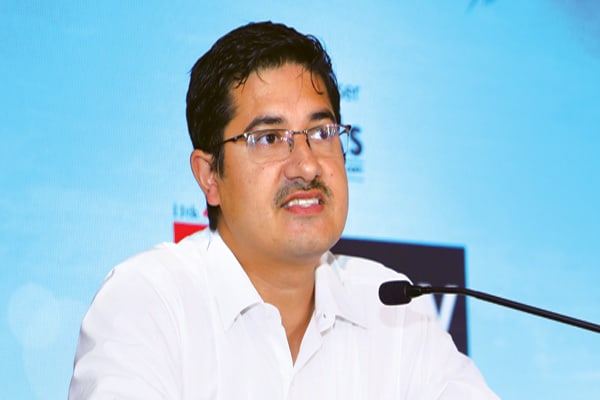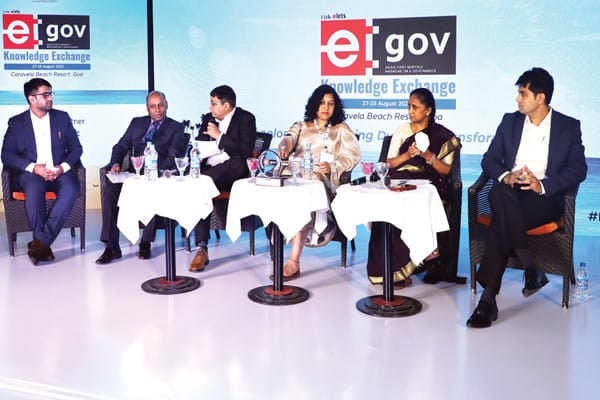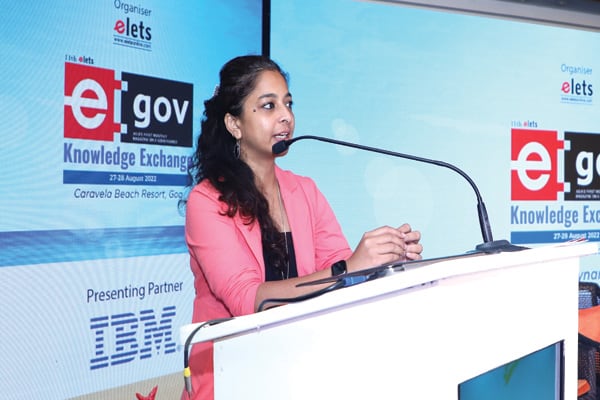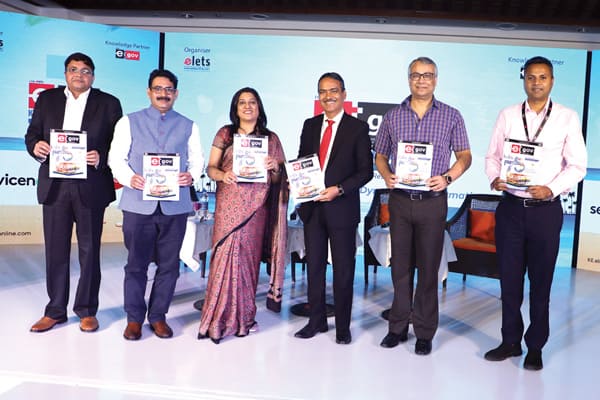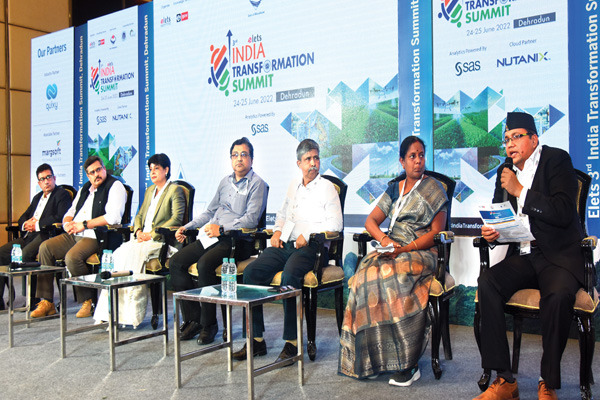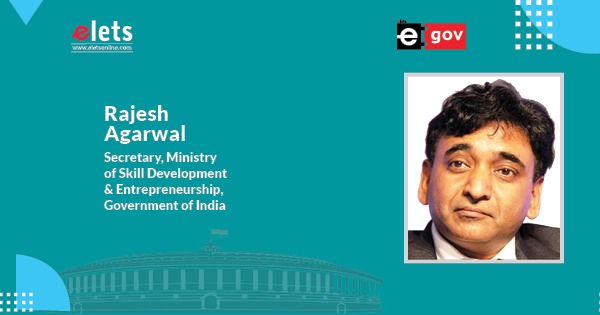
India, a fledgling democracy, continues to invest heavily in the education system, the results of which can be gauged from the dramatic rise of its IITs or IIMs. Today, it boasts of 23 IITs, 20 IIMs and 19 AIIMS which has made India a leading nation in delivering of education. But to make it truly meaningful, India must work in the direction of harnessing the massive demographic dividend. Highlighting this, Dipak Desai, Director, Directorate of Skill Development and Entrepreneurship, Government of Goa; M Nagarajan, Commissioner Higher Education, Government of Gujarat; Anju Sharma, Principal Secretary, Labour, Employment and Skill Department, Government of Gujarat and Rajiv Rattan, Director, Department of Higher Education, Government of Haryana shared their thoughts at the Elets Knowledge Exchange Summit, Goa.
Edited excerpts:

Dipak Desai, Director, Directorate of Skill Development and Entrepreneurship, Government of Goa
Using technology, India can further excel on its transformational journey in education and skilling, said Dipak Desai, Director, Directorate of Skill Development and Entrepreneurship, Government of Goa. Highlighting that vocational education and skilling are the need of the hour, he said “When I took over in the skill development and entrepreneurship department, there were various technical challenges prevailing in the state. Most of the Central government schemes were either not implemented or had been in a poor state. So, we started a private training partnership in Prime Minister Kaushal Vikas Yojana (PMKVY) and made all our ITIs training partners in PMKVY. The model became so effective that it is now being followed at the pan-India level.”

“We started a private training partnership in PMKVY (Prime Minister Kaushal Vikas Yojana) and made all our ITIs training partners in PMKVY. The model became so effective that it is now being followed at the pan-India level.” – Dipak Desai, Director, Directorate of Skill Development and Entrepreneurship, Government of Goa.”
Highlighting the various initiatives being undertaken in this regard, he said, “Unlike other states where state skilling programs like Chief Minister Kaushal Vikas Yojana (CMKVY) exists, Goa had no such scheme. So, we are soon going to launch CMKPY – Chief Minister Kaushal Path Yojana. Another thing is, though ITIs are run and managed by the government, there are certain regulations and compliances which act as hindrances to the proper implementation of the skilling program. Therefore, through CMKPY, we aim to bypass such stumbling blocks. Under Sankalp women entrepreneurship, they arranged a program at the taluka, districts, and state levels which turned out to be very successful. As a result, people in Goa now know about such schemes and departments, which was not the case earlier.” Giving greater emphasis on apprenticeship, he concluded, “Apprenticeship plays an important role in this regard. Many organisations had no knowledge about it. Through our awareness drive, today 70 per cent of the companies in Goa engage in apprenticeship programs.”

M Nagarajan, Commissioner Higher Education, Government of Gujarat
In order to make skilling drive a success, there is a need to break all the silos and comfort mentality, and at the same time, a multidisciplinary approach to problem solving has to be encouraged. The gap between haves and have nots has to be bridged in education, said M Nagarajan, Commissioner Higher Education, Government of Gujarat.

He said that a lot of steps have been taken in the direction of education and skilling, especially with regard to upskilling and partnership. “We are supporting college students to come up with their ideas for innovations. Once these ideas are presented to the panel at the university, the IDR (Incentive Distribution Rights) level funding is provided to the students,” he said, adding that these kinds of opportunities provide youth a platform to work for their future and take a career-oriented recourse. He also said that there is a need to look at education and skilling in tandem and together. “With these mindsets, we can plan strategically in making our skilling aspect in education more viable,” Nagarajan said.
He further added that in the last five years, more than 6,000 ideas had been funded and over 800 patents had been filed. “We also did a large-scale certification program for college faculty. So now, at least one of the two faculties in each and every college or university is qualified, and is knowledgeable enough to guide the students. We have also implemented supportive and enabling initiatives which are called the Gujarat state IP guidelines for a group of teachers to mentor the students,” he said, adding that only startup, entrepreneurship and IT are sunrise sectors, rest all are sunset. “We can teach and train our students more holistically in alignment with emerging opportunities in the sunrise sector,” he said.
He further added that in Gujarat state student innovation hub, they worked on co-creation with big corporates like Mahindra, Nestle and state level public sector units like GUVNL, whose problems statements were identified and spe\cial hackathons were proposed to the college students. So, this has created a culture of ideation, innovation and entrepreneurship. In regard to higher education, he said that they are promoting embedded internships and they also converge with other departments so that students are exposed to different ideas and skills. “We must do away with the departmental mentality where one department refrains from engaging effectively with other departments, as it is really detrimental for making effective strides,” Nagarajan said.
Highlighting the various initiatives students or the students in the interior areas, to have a glimpse of technologies coming up.”
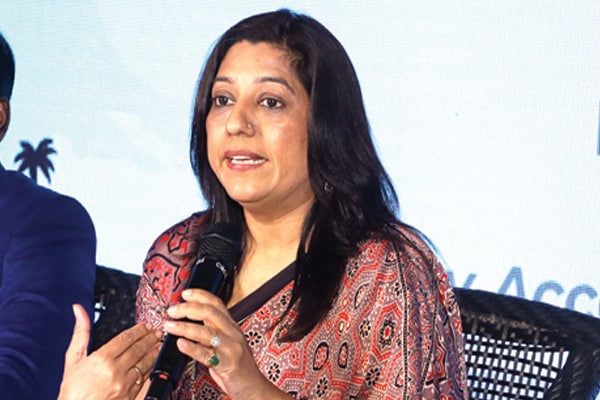
Anju Sharma, Principal Secretary, Labour, Employment and Skill Department, Government of Gujarat
Technology has transformed the entire functioning of the education department. It has made education more tech oriented and digitally enabled, said Anju Sharma, Principal Secretary, Labour, Employment and Skill Department, Government of Gujarat. “Through NEP, the entrenched biasness of various streams viz., Arts, Commerce and Science which existed not only at school level but also at a society level will now be done away with,” she said.
“At the district level, we have reinvigorated the team officials and the entire ITI system has now been centralised into one portal for the students to apply for the ITI (Industrial training Institute) admission. Their marks will also be verified by the board members. If they fail to get ITIs of their choice, they can reapply,” she added She further added that there is need to take into consideration the market dynamics to take a gauge of the fact as to which ITI is doing best and which one is lagging behind, so that effective reassessment can be made accordingly. To make ITI education and output more effective, she highlighted three points- remove, reduce and improve, using which the Gujarat government has turned around the image of ITIs in the state. She said those IITs, where courses were not getting registered or were attracting least students, were removed. Those ITIs where students were coming in less numbers, their numbers were reduced. And those IITs which were doing excellent work were further improved.
Sharing concerns on the shortage of skilled manpower in the IT sector, she said, “If IT does not get the kind of manpower it wants, India as a nation will suffer badly. So, we must make sure that a regular pool of skill talents always remains at the disposal of the IT sector.”
Speaking on the importance of skilling, she said that the education system has to be upgraded and be more in line with career aspirations of contemporary times. Emerging technologies like AI, ML, robotics are creating huge job opportunities because of the enormous amount of analysis and demands it’s throwing on the market. Concluding her speech, she said, “Growth of the current economy is now going to be predominantly in the service sector, so the rate of increase in the service sector is very high. The Service sector offers a lot of potential for jobs and even the manufacturing sector requires the need of having a service oriented mechanism in its offerings.”

Rajiv Rattan, Director, Department of Higher Education, Government of Haryana
The National Education Policy (NEP) 2020 is a transformational step in making education more aligned with the contemporary demands of time, said Rajiv Rattan, Director, Department of Higher Education, Government of Haryana. With the view to help in the overall development of a child, the 16 deliverables in the NEP 2020 viz., quality, multidisciplinary approach, optimal learning, internationalisation of education, teachers-training, and ethics among others are going to make major strides in rendering education more practical and future-oriented.
“Aligning our plan with the objectives envisioned in the NEP 2020, we are soon going to set up an ‘Institute of Emerging Technologies’ in Gurugram, which will function under the aegis of Gurugram University. The institute will delve into the study of emerging technologies in the IT or science field because, in government, people often tend to focus only on the prevailing technologies and not others. So, through this, the study related to the emergence of technologies will be taken care of,” he said.
He further added that they are also proposing research and innovation in 6 multidisciplinary fields which are mentioned in vedas too, like prithvi (land), jal (water), vayu (air), agni (fire), van (forests) and vatavaran (environment). “Not only will it generate a sense of competition among the various public and private universities in the state to excel further in the field of innovation, but will also help in getting maximum or optimal grants from the state,” Rattan said.
“To make education more inclusive and accessible in Haryana, we have made sure that there exists a college within a 20-kilometre radius of any particular area. With a small population of only 3 crore people, Haryana today has 178 government colleges, 97 engineering colleges, and more than 200 self- financed colleges,” said Rattan.
“With 10 universities in higher education and four in technical education, the state also has 20 private universities in higher and technical education. We also have one skill university named Vishwakarma Skill University in Palwal, which focuses on mainstreaming skilled workers by helping them get good income and recognition. Almost all universities in Haryana collaborate with international universities through student exchange, teacher exchange and content management programs,” he added.
“So, we are doing everything possible to transform the education system in the state,” he concluded.
Be a part of Elets Collaborative Initiatives. Join Us for Upcoming Events and explore business opportunities. Like us on Facebook , connect with us on LinkedIn and follow us on Twitter, Instagram.




